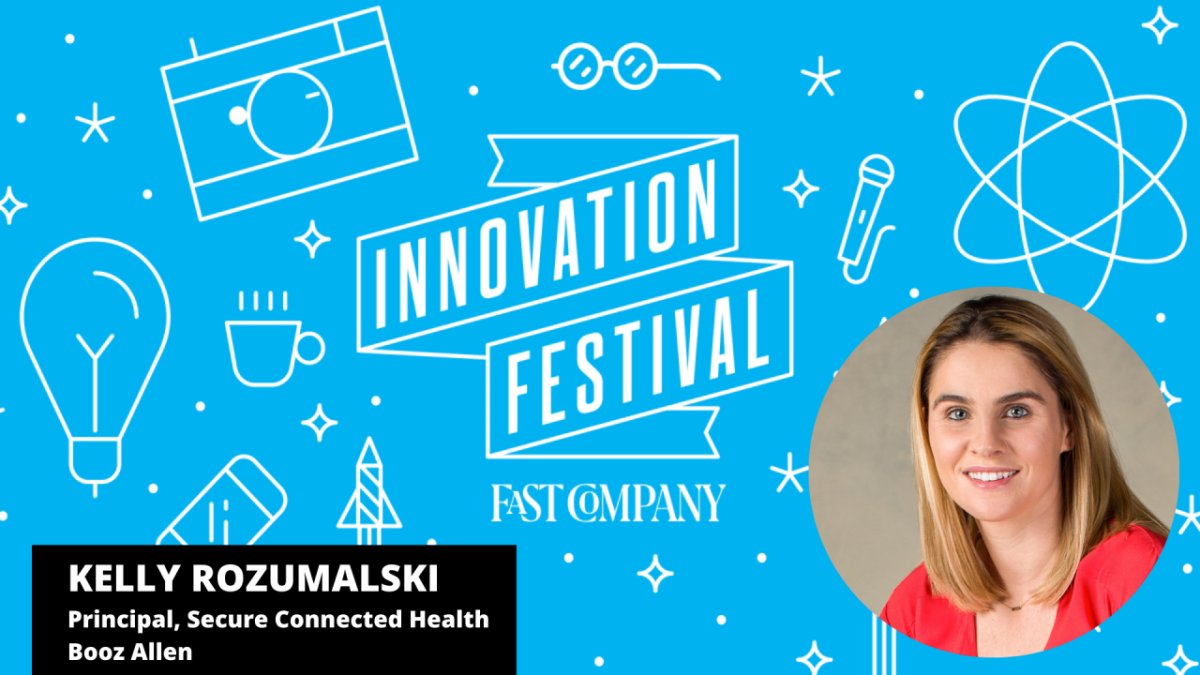Booz Allen's Kelly Rozumalski: Cybersecurity and Connected Health at the Fast Company Innovation Festival

Last month, Booz Allen served as the Presenting Sponsor of the first-ever virtual Fast Company Innovation Festival, with firm leaders joining compelling panel discussions on innovation in government, cybersecurity, the space race, and the future of recreation. Join us as we recap these critical conversations in a dedicated series of posts.
What projects, products, ideas, and innovations are shaping the world? How can we build a truly better tomorrow? Each year, innovators from around the world convene at the Fast Company Innovation Festival to share their experiences, insights, and inspirations.
Booz Allen Principal Kelly Rozumalski, a leader within the firm's secure connected health initiatives, joined Kevin Tierney, the vice president of cybersecurity at GM, and Alissa Abdullah (Dr. Jay), who’s currently senior vice president and deputy chief officer at MasterCard and served as a CIO during the Obama Administration.
Severe—and intensifying—threats
“When we talk about healthcare, cybersecurity isn't always at the top of everyone's mind, and the risks aren't always well known,” Rozumalski said. “But the consequences of these cyber risks can be incredibly severe.”
For example, patient healthcare data is often considered more valuable than credit card information on the dark web because it includes all a patient’s personally identifiable information, she said. And cyber-attacks that take devices like robotic surgery equipment or CT scanners offline put the patients themselves at risk.
Today’s increasing reliance on connected technologies intensifies the threat.
“Automated insulin pumps, patient monitors, MRI machines, they're all now connected to the internet,” Rozumalski said. “As these devices become more connected, they expand the attack surface, and frankly, they become much easier to disrupt through a potential cyber-attack.”
Digital transformation demands stronger security
Yet these same connected technologies are also driving powerful advances in patient care: apps that help us understand our health status, real-time MRI processing in the cloud, AI-powered solutions that inform swifter treatment decisions, and more.
Rozumalski expects this trend to continue, particularly as the COVID-19 pandemic and new technologies continue to accelerate healthcare digitalization.
“When we look at our broad digital ecosystem, things such as 5G, quantum computing, IoT, these are all things that are enabling the market to grow at an extremely fast pace,” Rozumalski said. “As organizations continue to bring new digital technologies to the market, especially at today’s rapid pace, all of this innovation has to sit on a foundation of cybersecurity.”
What’s ahead for connected health?
Rozumalski predicts exciting things in connected health, citing quantum computing, 5G-enabled wearables, and an overall move beyond monitoring our health status into more predictive and proactive care.
“Whatever this next big technology is, it's going to need to be secure,” she said. “Cybersecurity has to be at the intersection of medicine, innovation, and technology. And I firmly believe that cybersecurity is going to help accelerate this innovation instead of delaying it.”
Watch the full Fast Company Innovation Festival panel discussion and learn more about innovation at Booz Allen.

